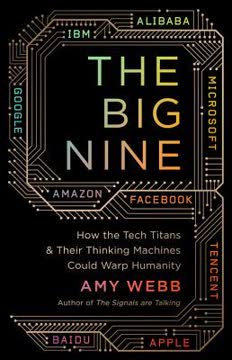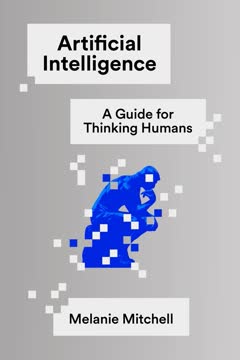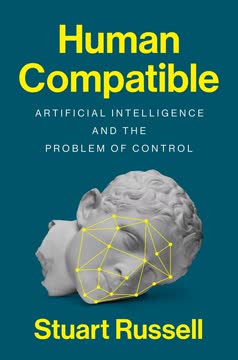Key Takeaways
1. AI's Four Waves: Reshaping Industries and Societies
The complete AI revolution will take a little time and will ultimately wash over us in a series of four waves: internet AI, business AI, perception AI, and autonomous AI.
Internet AI is already here, reshaping our digital experiences through recommendation engines and personalized content. Business AI is optimizing corporate decision-making by mining vast datasets. Perception AI is digitizing our physical world, enabling machines to see, hear, and understand us. Autonomous AI, still in development, promises to revolutionize transportation and manufacturing.
These waves are not discrete; they overlap and reinforce each other:
- Internet AI: Powering platforms like Google, Facebook, and Toutiao
- Business AI: Enhancing financial services, healthcare diagnostics, and legal analysis
- Perception AI: Driving innovations in retail, home automation, and urban management
- Autonomous AI: Transforming industries through self-driving cars, drones, and robotics
2. China and US: The AI Superpowers in a Technological Cold War
Together, these businesses and scholars have turned China into a bona fide AI superpower, the only true national counterweight to the United States in this emerging technology.
Contrasting strengths. The US leads in cutting-edge AI research and attracts global talent, while China excels in AI implementation and data collection. China's advantages include:
- Massive user base generating invaluable data
- Government support and funding for AI initiatives
- Ecosystem of tenacious entrepreneurs and robust manufacturing capabilities
Collaborative potential. Despite the competitive rhetoric, AI development is not a zero-sum game. Both nations can contribute to global AI progress:
- US: Pioneering fundamental AI research and fostering innovation
- China: Rapidly deploying AI solutions and scaling applications
- Potential for cross-border collaborations to tackle global challenges
3. Job Displacement: The Real AI Crisis Looming on the Horizon
Within ten to twenty years, I estimate we will be technically capable of automating 40 to 50 percent of jobs in the United States.
Widespread impact. AI-driven automation will affect jobs across the spectrum, from blue-collar to white-collar professions:
- Routine cognitive tasks (e.g., data analysis, basic writing) easily automated
- Physical jobs requiring dexterity and adaptability more resilient in short term
- Creative and emotionally intelligent roles least vulnerable to immediate displacement
Economic consequences:
- Widening income inequality as AI concentrates wealth
- Potential for technological unemployment on an unprecedented scale
- Erosion of the middle class and social instability
4. Beyond Algorithms: The Importance of Human Love and Compassion
For all of AI's astounding capabilities, the one thing that only humans can provide turns out to also be exactly what is most needed in our lives: love.
AI's limitations. Despite its cognitive prowess, AI lacks emotional intelligence and the capacity for genuine human connection. This revelation came to the author through a personal crisis:
- Cancer diagnosis forced reevaluation of life priorities
- Recognition of the irreplaceable value of human relationships and empathy
Redefining human value. As AI takes over many traditional job functions, we must shift our focus:
- From productivity and economic output to compassion and emotional intelligence
- Embracing uniquely human qualities that AI cannot replicate
- Fostering a society that values care, creativity, and interpersonal connections
5. Redefining Work: Embracing Human-AI Symbiosis
If we can create this synergy, it will let us harness the undeniable power of artificial intelligence to generate prosperity while also embracing our essential humanity.
Collaborative model. The future of work lies in human-AI partnerships, not competition:
- AI handles routine, data-driven tasks
- Humans focus on empathy, creativity, and complex problem-solving
Emerging opportunities:
- Healthcare: AI-powered diagnostics paired with compassionate caregivers
- Education: Personalized AI learning tools complemented by empathetic human teachers
- Customer service: AI handling inquiries, humans providing emotional support
Cultural shift required:
- Moving beyond viewing humans as mere economic units
- Valuing and rewarding social and emotional intelligence
- Fostering lifelong learning and adaptability in the workforce
6. Social Investment Stipend: A New Social Contract for the AI Age
I propose we explore the creation not of a UBI but of what I call a social investment stipend.
Beyond UBI. The author proposes a more nuanced approach to addressing AI-induced job displacement:
- Government salary for socially beneficial activities
- Focus on care work, community service, and education
- Rewards prosocial behavior while providing economic security
Implementation challenges:
- Defining eligible activities and performance metrics
- Balancing freedom of choice with social benefit
- Securing funding through taxation of AI-generated wealth
Potential benefits:
- Preserves human dignity and sense of purpose
- Fosters a more compassionate and interconnected society
- Provides economic stability while encouraging social contribution
7. Global Collaboration: Harnessing Diverse Wisdom for an AI Future
No single country will have all the answers to the tangled web of issues we face, but if we draw on diverse sources of wisdom, I believe there is no problem that we can't tackle together.
Diverse perspectives. Different cultures and societies offer unique insights for navigating the AI revolution:
- South Korea: Gifted education programs for nurturing top talent
- Switzerland and Japan: Craftsmanship culture valuing human artistry
- Canada and Netherlands: Robust volunteering traditions
- Bhutan: Alternative measures of progress like Gross National Happiness
Policy experimentation. Countries are taking varied approaches to AI governance:
- Europe: Stringent data protection and antitrust measures
- US and China: More laissez-faire approach to foster innovation
- Opportunity to learn from diverse regulatory frameworks
Collaborative imperative. The global nature of AI's impact necessitates international cooperation:
- Sharing best practices in education and workforce development
- Coordinating on ethical AI development and deployment
- Addressing shared challenges like job displacement and inequality
Human agency is crucial in shaping our AI future. By embracing diverse perspectives and fostering global collaboration, we can harness AI's potential while preserving our humanity.
Last updated:
FAQ
What's AI Superpowers about?
- AI Competition: AI Superpowers by Kai-Fu Lee examines the intense competition between the United States and China in the realm of artificial intelligence, highlighting each country's unique strengths.
- Societal Impact: The book explores the profound implications of AI on jobs, the economy, and global power dynamics, discussing both potential benefits and challenges.
- Personal Insights: Lee shares his experiences as an AI researcher and venture capitalist, offering a personal perspective on the evolution of AI technologies and their societal impacts.
Why should I read AI Superpowers?
- Global Dynamics: The book is crucial for understanding the future of technology and its geopolitical implications, particularly how AI will influence global power structures.
- Informed Predictions: Lee provides insights into how AI will transform various industries and job markets, helping readers prepare for upcoming changes.
- Cultural Perspectives: It contrasts the entrepreneurial cultures of Silicon Valley and China, offering a deeper understanding of how these environments foster innovation.
What are the key takeaways of AI Superpowers?
- Transformative Force: AI is not just a technological advancement but a transformative force that will redefine economies and societies.
- China's Progress: China has rapidly caught up to the U.S. in AI, driven by government support, vast data resources, and a competitive entrepreneurial environment.
- Human-AI Collaboration: Lee advocates for a future where humans and AI coexist, focusing on enhancing human capabilities rather than replacing them.
What are the best quotes from AI Superpowers and what do they mean?
- "We’re all full of questions without answers.": This quote reflects the uncertainty surrounding AI's future and the need for societal discussions about its implications.
- "AlphaGo’s victories were both a challenge and an inspiration.": It highlights how technological advancements can spur nations to innovate and compete, especially in AI.
- "Our AI future will be created by us.": Lee emphasizes human agency in shaping AI's future, suggesting that our choices will determine its societal impact.
How does Kai-Fu Lee define AI superpowers in AI Superpowers?
- Superpowers Definition: AI superpowers are nations that effectively harness AI technologies to drive economic growth and influence global affairs.
- China vs. U.S.: While the U.S. has historically led in AI research, China is emerging as a formidable competitor due to its unique advantages.
- Data Importance: Data is a critical resource for AI development, and countries with vast data access will have a significant edge.
What are the four waves of AI discussed in AI Superpowers?
- Internet AI: Enhances online experiences with applications like recommendation algorithms used by companies such as Alibaba and Google.
- Business AI: Optimizes traditional business processes, improving efficiency in sectors like finance and healthcare.
- Perception AI: Interprets sensory data, enabling applications like facial recognition and autonomous vehicles.
- Autonomous AI: Encompasses fully autonomous systems, such as self-driving cars and drones, with profound industry implications.
How does AI Superpowers address the potential job displacement caused by AI?
- Job Loss Predictions: Lee predicts AI could replace 40-50% of jobs in the U.S. within the next 15 years, affecting both low-skill and high-skill positions.
- Historical Context: The book draws parallels to past technological revolutions, suggesting society has historically adapted to such changes.
- Need for Adaptation: Emphasizes the importance of education and policy adjustments to ensure workers can transition into new roles.
What is the significance of the "Sputnik Moment" in the context of AI in AI Superpowers?
- Cultural Awakening: The term describes how AlphaGo's victory ignited a national obsession with AI in China, similar to the U.S. response to the Soviet satellite launch.
- Government Mobilization: Led to significant government investment and policy initiatives aimed at making China a global AI leader.
- Inspiration for Innovation: Served as a wake-up call for Chinese entrepreneurs and researchers, motivating aggressive AI advancements.
How does AI Superpowers compare the U.S. and China in terms of AI development?
- Different Approaches: The U.S. focuses on innovation and individualism, while China emphasizes rapid implementation and government support for AI initiatives.
- Cultural Factors: Cultural attitudes towards technology, data privacy, and government intervention influence AI progress in each country.
- Future Predictions: Lee predicts China may surpass the U.S. in AI implementation due to its advantages in hardware manufacturing and data availability.
What role does data play in AI development according to AI Superpowers?
- Data as a Resource: Data is the most critical resource for AI development, surpassing even computing power and talent.
- China's Advantage: China's vast population and digital ecosystem generate enormous data amounts, giving Chinese companies a significant edge in training AI algorithms.
- Quality of Data: Not only quantity but also the quality of data—how it reflects real-world behaviors and preferences—is crucial for effective AI applications.
What is the proposed social investment stipend in AI Superpowers?
- Definition and Purpose: A proposed government salary for individuals engaging in socially beneficial activities, such as care work and community service.
- Contrast with UBI: Unlike universal basic income, the stipend requires participation in meaningful activities, fostering community and purpose.
- Cultural Shift: Encourages valuing human connections and compassion over solely economic productivity, aiming for a more humane society in the AI age.
How does AI Superpowers envision the future of work?
- Human-Machine Collaboration: Envisions a future where humans and AI work together, with machines handling routine tasks while humans provide emotional and creative input.
- Emergence of New Professions: Predicts new roles prioritizing human interaction and empathy, essential in an AI-dominated world.
- Cultural Shift in Values: Requires valuing care, service, and education as essential societal components, redefining success and fulfillment beyond traditional economic metrics.
Review Summary
AI Superpowers offers a comprehensive look at the AI race between China and the US, exploring its impact on jobs, economy, and society. Readers praise Lee's balanced perspective and insider knowledge of both countries' tech scenes. While some find the personal anecdotes distracting, many appreciate the author's insights on AI's potential benefits and risks. The book is lauded for its accessibility to non-experts and its thought-provoking ideas on adapting to an AI-driven future.
Similar Books










Download PDF
Download EPUB
.epub digital book format is ideal for reading ebooks on phones, tablets, and e-readers.





